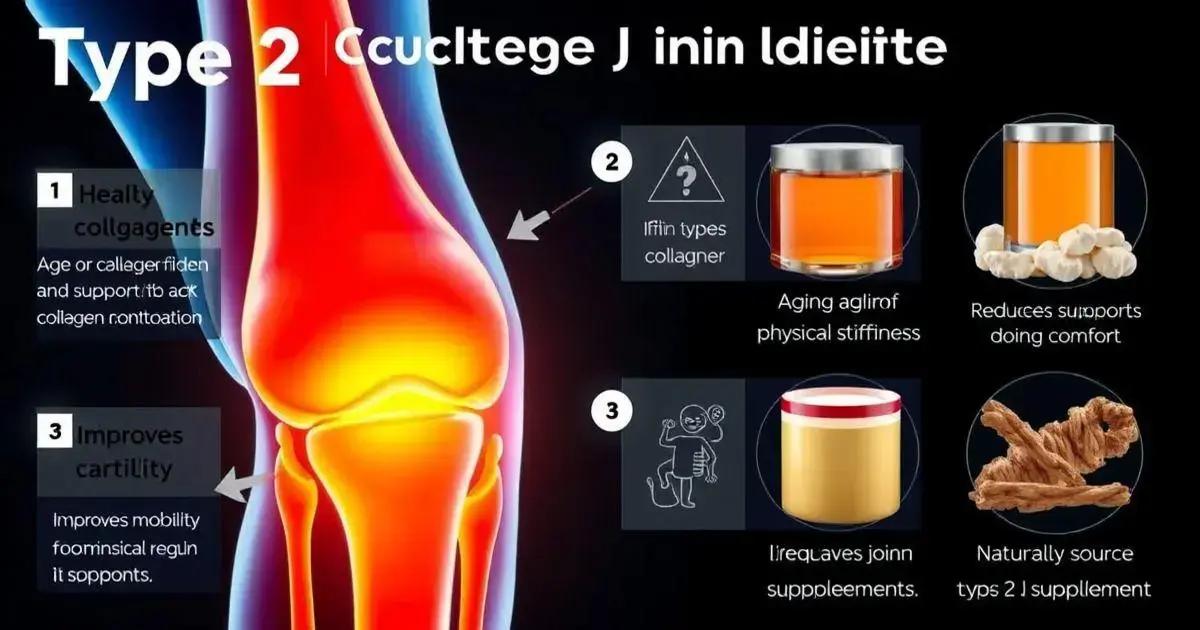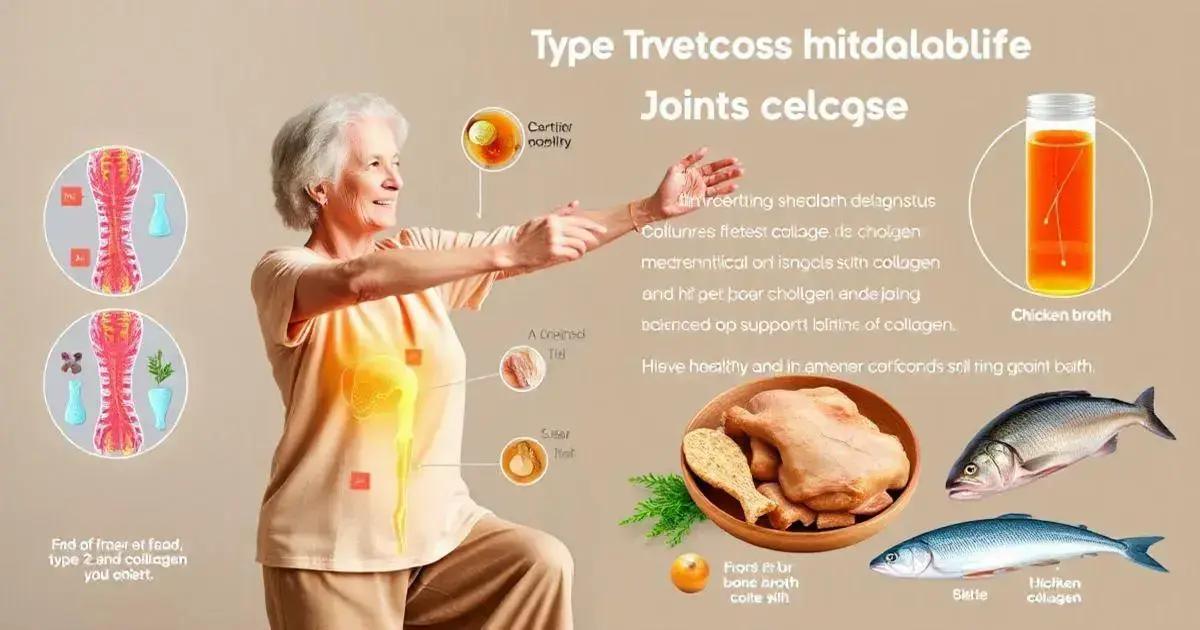Boswellia serrata extract, derived from the resin of the Boswellia serrata tree, is renowned for its strong anti-inflammatory properties, primarily due to its high content of boswellic acids. This natural remedy is effective in alleviating pain and inflammation, especially in conditions like arthritis, and may also provide antioxidant benefits to combat oxidative stress. Commonly available in capsules and powders, it has a rich history in traditional Ayurvedic medicine as a holistic approach to improving health and well-being.
Type 2 collagen is a vital protein primarily found in cartilage, the connective tissue that cushions joints. As we age or experience physical stress, the production of type 2 collagen can decline, leading to stiffness and joint discomfort. Understanding the role of type 2 collagen in joint health can empower you to take steps to improve and maintain mobility.
This article will explore the benefits of type 2 collagen and how to incorporate it into your health regimen for optimal joint support.
What is Type 2 Collagen?
Type 2 collagen is a specific form of collagen primarily found in cartilage, the flexible tissue that cushions joints. It is the most abundant type of collagen in the cartilage matrix and plays a crucial role in maintaining the structure and function of joints.
Unlike type 1 collagen, which is commonly found in skin, bones, and tendons, type 2 collagen is specifically designed to provide strength and support to cartilage. This type of collagen is composed of amino acids that form a triple helix structure, which is essential for providing tensile strength and flexibility to cartilage, allowing joints to absorb shock and withstand pressure during movement.
Type 2 collagen is found in various sources, including chicken cartilage, bovine cartilage, and marine sources. It is often used in supplements to support joint health, particularly for individuals with osteoarthritis or other joint-related issues. Understanding the properties and functions of type 2 collagen can help individuals make informed decisions about their health and wellness, particularly when it comes to maintaining joint mobility and reducing discomfort.

The Role of Type 2 Collagen in Joint Health
The role of type 2 collagen in joint health is critical, as it serves as a primary component of cartilage, which cushions joints and facilitates smooth movement. Here’s how type 2 collagen contributes to joint health:
- Structural Integrity: Type 2 collagen provides essential structural support to cartilage, enabling it to withstand the mechanical stresses placed on joints during physical activities. This structural integrity is vital for maintaining joint function and preventing discomfort.
- Shock Absorption: By forming a resilient matrix within cartilage, type 2 collagen plays a key role in shock absorption. This helps protect joints from the impact and friction that occur during movement, reducing the risk of injury.
- Maintaining Cartilage Health: Type 2 collagen contributes to the overall health and maintenance of cartilage. It helps preserve the elasticity and flexibility of cartilage, which is crucial for smooth movement and joint function.
- Reducing Inflammation: Type 2 collagen has been shown to possess anti-inflammatory properties, which can help alleviate joint inflammation and pain associated with conditions such as arthritis. This reduction in inflammation can enhance overall joint comfort and mobility.
- Promoting Repair and Regeneration: In cases of cartilage injury or wear, type 2 collagen supports the repair and regeneration processes. By providing the necessary building blocks for new cartilage formation, it aids in restoring joint function and alleviating pain.
- Supporting Synovial Fluid Production: Type 2 collagen is involved in the production of synovial fluid, which lubricates joints and reduces friction. Adequate synovial fluid is essential for maintaining joint health and preventing stiffness.
Overall, type 2 collagen is essential for maintaining healthy joints, reducing pain, and enhancing mobility. Ensuring adequate levels of type 2 collagen through diet or supplementation can significantly benefit joint health, particularly as we age or engage in physical activities.
Benefits of Type 2 Collagen for Joints
The benefits of type 2 collagen for joints are extensive and can greatly improve joint health and overall mobility.
Here are some key advantages:
- Reduces Joint Pain: Type 2 collagen supplementation has been shown to help alleviate joint pain, especially in individuals suffering from osteoarthritis and other joint disorders. By supporting cartilage repair, it can lead to significant pain relief.
- Improves Joint Flexibility: Regular intake of type 2 collagen can enhance the elasticity and flexibility of cartilage, allowing for greater range of motion and improved joint function. This is particularly beneficial for those who want to maintain an active lifestyle.
- Supports Cartilage Regeneration: Type 2 collagen is essential for the repair and regeneration of damaged cartilage. Supplementing with type 2 collagen can promote the healing of joint injuries and help restore normal joint function.
- Enhances Overall Joint Function: By maintaining healthy cartilage and reducing inflammation, type 2 collagen contributes to improved overall joint function, allowing for better performance in sports and daily activities.
- Promotes Joint Lubrication: Type 2 collagen aids in the production of synovial fluid, which lubricates joints and reduces friction. Adequate lubrication is crucial for smooth joint movement and can help prevent stiffness and discomfort.
- May Help Prevent Joint Degeneration: Regular supplementation of type 2 collagen may slow down the progression of joint degeneration associated with aging or repetitive stress, thereby preserving joint health over time.
Incorporating type 2 collagen into your diet, whether through food sources or supplements, can provide these substantial benefits and contribute to maintaining healthy, functional joints throughout your life.

How to Incorporate Type 2 Collagen into Your Diet
Incorporating type 2 collagen into your diet can be a great way to support joint health and overall well-being. Here are some effective strategies to include type 2 collagen in your daily routine:
- Collagen Supplements: One of the most convenient ways to increase your type 2 collagen intake is through supplements. Look for high-quality type 2 collagen powders, capsules, or liquid forms that can easily be added to your diet. You can mix collagen powder into smoothies, coffee, or yogurt for a nutrient boost.
- Bone Broth: Bone broth is a rich source of type 2 collagen, made by simmering animal bones and connective tissues. Incorporate bone broth into soups, stews, or drink it as a warm beverage. This natural source provides not only collagen but also other beneficial nutrients.
- Gelatin: Gelatin, a cooked form of collagen, can be utilized in various recipes. Use gelatin in desserts, jellies, or homemade gummies to enjoy its benefits while satisfying your sweet cravings.
- Type 2 Collagen-Rich Foods: Include foods that naturally contain type 2 collagen or promote its production, such as chicken skin, fish, and egg whites. These foods provide essential amino acids necessary for collagen synthesis in the body.
- Vitamin C-Rich Foods: Since vitamin C is crucial for collagen synthesis, make sure to include plenty of fruits and vegetables rich in this vitamin, such as citrus fruits, strawberries, kiwi, and bell peppers. This will enhance your body’s ability to produce collagen.
- Healthy Fats: Consuming healthy fats such as avocados, nuts, and olive oil can support overall joint health. These fats provide essential nutrients that work synergistically with collagen for optimal benefits.
By implementing these strategies into your diet, you can effectively boost your type 2 collagen intake and support your joint health. As always, consult a healthcare professional before starting any new supplement regimen, particularly if you have specific health concerns.
When to Consider Type 2 Collagen Supplements
Considering type 2 collagen supplements can be beneficial in specific situations where dietary intake may not be sufficient or when certain health concerns arise. Here are some scenarios in which you should think about incorporating type 2 collagen supplements into your routine:
- Aging: As we age, natural collagen production decreases, leading to joint stiffness, pain, and reduced mobility. If you’re experiencing these age-related issues, type 2 collagen supplements can help support joint health and improve comfort.
- Chronic Joint Pain or Arthritis: If you suffer from chronic joint pain, especially due to conditions like osteoarthritis, type 2 collagen supplementation may help reduce pain and improve joint function by providing the necessary building blocks for cartilage repair.
- Active Lifestyle or Sports Training: For those who engage in regular physical activity or intense training, type 2 collagen supplements can aid in recovery, support joint integrity, and help prevent injuries associated with repetitive stress on the joints.
- Post-Injury Recovery: If you have recently suffered a joint injury or undergone surgery, type 2 collagen supplements may promote healing and support the regeneration of damaged cartilage and connective tissues.
- Skin Health Concerns: Given that type 2 collagen also contributes to skin health, if you’re looking to improve skin elasticity and hydration, you might consider these supplements as part of your beauty regimen.
- Poor Dietary Intake: If your diet lacks sufficient sources of type 2 collagen-rich foods, such as chicken skin, fish, or bone broth, supplements can help fill this gap and ensure you’re getting enough collagen to support your joints and overall health.
Before starting any type 2 collagen supplement, it’s essential to consult with a healthcare professional to ensure it’s appropriate for your individual needs and health conditions.
Conclusion
In conclusion, type 2 collagen plays a vital role in maintaining joint health and overall mobility.
Understanding what type 2 collagen is, its significance in joint function, and the numerous benefits it offers can empower you to take proactive steps towards supporting your joints through dietary choices and supplementation.
Incorporating type 2 collagen into your diet, whether through natural food sources or high-quality supplements, can help reduce pain, improve flexibility, and promote cartilage regeneration.
Recognizing when to consider type 2 collagen supplements, especially in the context of aging or joint-related issues, can lead to a significant improvement in your quality of life.
Prioritize your joint health today by exploring type 2 collagen options and making informed decisions that will help keep you active and mobile for years to come!
FAQ – Frequently Asked Questions about Boswellia Serrata Extract
What is boswellia serrata extract used for?
Boswellia serrata extract is primarily used for its anti-inflammatory properties and to support joint health.
How does boswellia serrata extract work?
Boswellia serrata extract contains boswellic acids, which help inhibit inflammatory pathways in the body, reducing pain and inflammation.
Are there any side effects of boswellia serrata extract?
Potential side effects can include gastrointestinal discomfort, allergic reactions, or interactions with certain medications.
How should I take boswellia serrata extract?
It is typically available in capsule, powder, or tincture form. Follow the dosage instructions on the product label or consult a healthcare professional.
Can boswellia serrata extract help with arthritis?
Yes, boswellia serrata extract may help reduce pain and improve joint function in individuals with arthritis.
Where can I buy boswellia serrata extract?
Boswellia serrata extract is available at health food stores, online retailers, and pharmacies.


